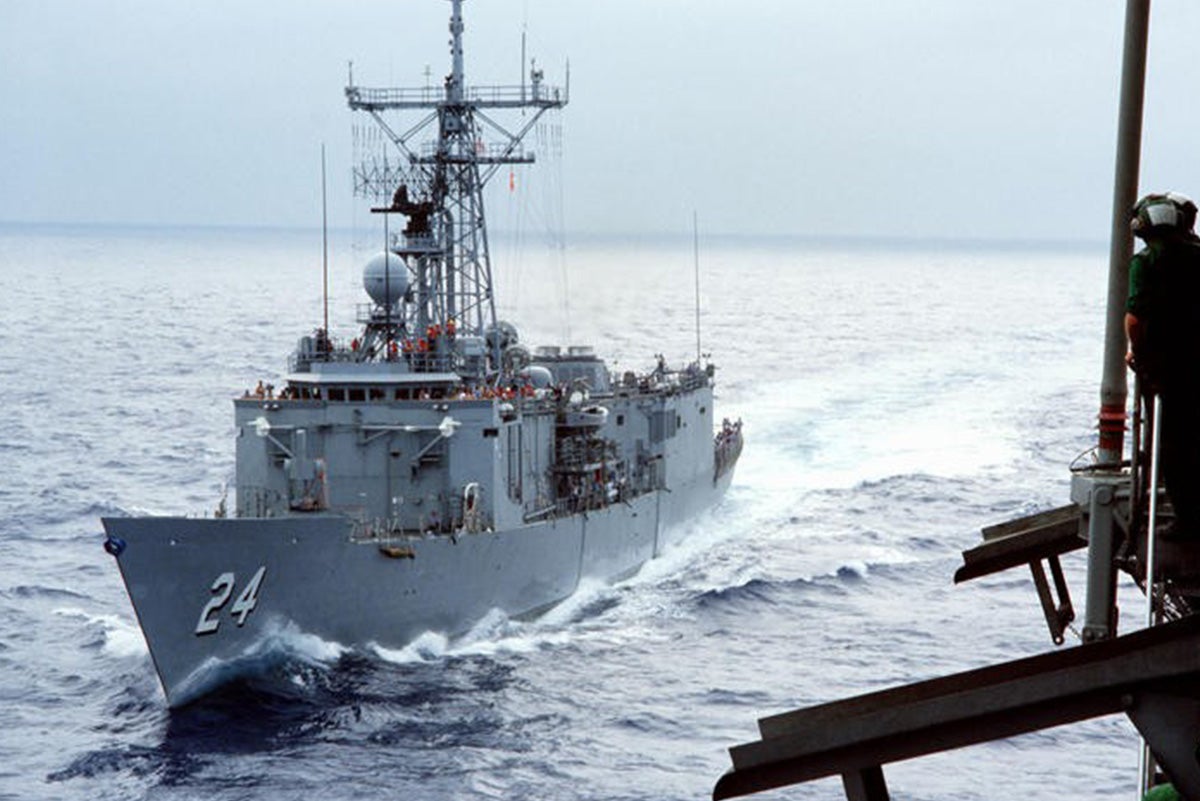The power of individuals coming together towards a common goal can create an unstoppable force. That’s not a theory. That’s a fact. You do not have to be in the military to have this experience either.
In retrospect, I suppose it’s no surprise that my voice in my head led me to join the Navy. I’ve always had a fascination with Navy ships. This dates back to my childhood. My mom’s brother, my Uncle Bill, was a Commander in the Navy. He was larger than life in my world. My grandparents had pictures in their house of the Navy ships he had served on and I used to stare at them for hours. One thing that always fascinated me as a child was how did those big ships stay afloat? How could something so big not sink straight to the bottom?
Life Lesson: It’s not the water outside or around a ship that causes it to sink. Only when water is allowed to flow in will it sink.
Fast forward many years: I'm now at the Navy’s recruit training (aka “boot camp”). Wondering how ships stay afloat has been replaced by the more practical issue of learning how to function as a team. Teaching teamwork to us raw recruits starts simply enough: Fold your clothes this way, make your bed that way, fold your towels this way, and so forth. Everyone does it the same way. Seems routine and boring, right? But the purpose of the exercise was to teach attention to detail, order, steps in a process, and being efficient with your time. All of these things I took for granted before training.
Photo Credit: www.history.navy.mil
Life lesson: It's not "me" – it's "us"
Here’s another thing about the exercise, you have to pass an inspection each morning. If something is wrong, you pay the price. Each day the price gets heavier. Week 1, day 3, you drop and do 13 pushups. Week 5, day 6, you drop and do 56 pushups. As time passes, you learn to help those who aren’t quite getting it. Here’s why: Do it wrong, the whole team pays the price, not just you. You also learn to ask for help because you do not want to be “the one” who is constantly causing the company to drop and do pushups.
This is another method of rebuilding the individual to think beyond him/herself and to start thinking of others – the team – all the time.
I was no longer important on my own. My importance was what I brought to the team. What was important was the team around me. There is no “look how great I am.” It’s all about “look how great we are.” Here’s why: If we were ever in a fight and our ship was hit and sinking, the person to my left and to my right were all I had to protect and save me. For my shipmates, I was the person to their left or their right. My shipmates were counting on me to do my job. Your best was expected, and nothing less was acceptable. Mediocrity, laziness, half-heartedness, procrastination, and bad days were not tolerated.
By working together, we could put out fires, contain flooding and save the ship from sinking. By panicking, or going your own way, or thinking only of yourself, ships sink. It’s that simple.
Working toward a common goal
The power of individuals coming together towards a common goal can create an unstoppable force. That’s not a theory. That’s a fact. You do not have to be in the military to have this experience either.
- You can have this every day when walking into work. It all starts with the individuals coming together for a common purpose.
- Even though some of the work seems redundant and mundane, the order and flow of the process ensures accuracy and minimizes mistakes.
- Asking for help is not a sign of weakness; it’s a definite sign of strength and a sign of seeking understanding.
- Most importantly, holding each other accountable is a key for success that often get overlooked.
There is absolutely nothing wrong with holding your team and your teammates accountable. And you should expect to be held accountable as well. When we hold each other accountable, we are telling each other that we have each other’s backs no matter what.
'All you have is your ship and your shipmates.'
Years later, during my first week aboard a ship, these lessons from recruit training came rushing back. After three days at sea and me wanting to throw up with every sway of the USS Jack Williams, I was finally able to leave my space and go "topside." It was nighttime. As soon as I stepped outside and the hatch (a door that keeps the water on the outside) closed behind me, I was immediately overwhelmed. The vastness of the Atlantic Ocean was mind-boggling. Out on the ocean, there’s nowhere to run. All you have is your ship and your shipmates. The crew is your family. Your ship is your home, your mode of transportation, your bed and your workplace. It’s your safe haven. Need I say the ocean is huge and would be a horrible place to be stranded without your home?
At times, I’ve had to be held accountable for my actions. That’s OK. I’m not perfect and I mess up. Every pencil needs to be sharpened from time to time. Even though it hurt to go through the accountability phase, I came out on the other side a better, wiser person.
Questions for land and sea
How is the team’s commitment to each other on your work unit? Is everyone working toward a common set of goals? Does the team know the goals? Are you holding each other accountable? Will people ask for help if needed? Is the water safely outside your ship, or has it already started leaking inside? If it’s leaking, how can you contribute to sealing off the leaks and righting the ship to get back on course?
Remember, It’s always about the team. It’s about something bigger.
We are all part of something bigger than ourselves. Whether it’s in our families, our marriages, with our children, our work relationships, our friendships, churches, communities … we are all part of something bigger. Each one of us as an individual contributes to something much greater than we can possibly comprehend. Make every day count.
Oh, and speaking of redundancy and process, I still fold my t-shirts and towels the same way to this day as I was taught in boot camp. Any veterans out there still do the same thing?
Learn more about St. Mary’s Military and Veterans Health Program

Jeff Brown is St. Mary’s Vice President of Support Services and director of St. Mary’s Military and Veterans Health Program. A veteran of the United States Navy, he served as a Petty Officer 2nd Class, Hospital Corpsman, in Europe, the Middle East and stateside.

